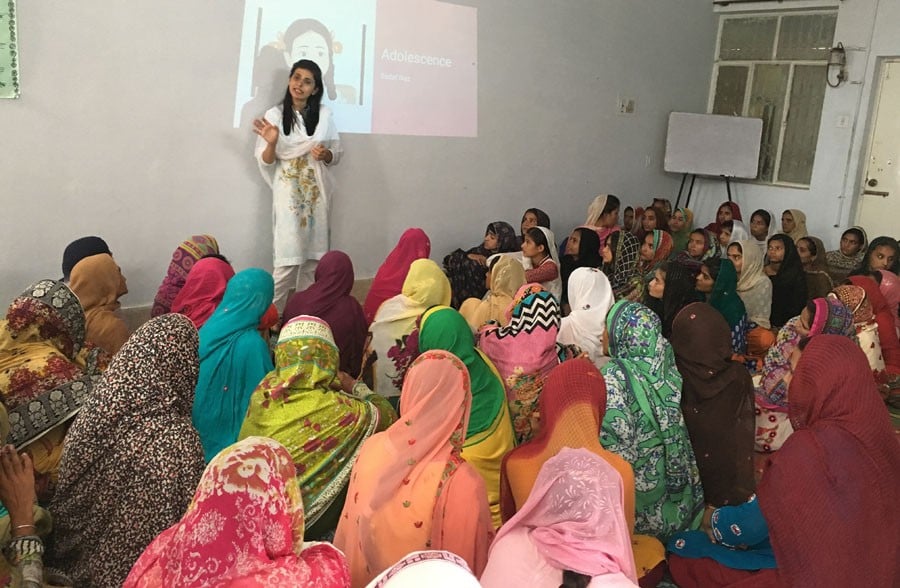
Sadaf Naz’s web portal offers sanitary products to women at their doorstep. The pharmacist turned entrepreneur also educates young girls on menstrual hygiene

Women starting from early teens till menopause kicks in in their mid-40s, undergo the natural process of menstruation. Regrettably, with us, this is a taboo subject, and even women discussing it amongst themselves consider it rather shameful; all of which often results in not knowing much about hygiene, and resorting to unhealthy practices.
This is especially true of people from the lower strata of society, particularly in rural areas where girls do not have access to information.
Prompted by her own experiences and observations in Okara, Sadaf Naz founded ‘Her Ground,’ an online shopping portal that offers sanitary products to women at their doorstep. Additionally, she took up the challenge to educate young girls in schools, colleges, and universities on personal and menstrual hygiene.
A pharmacist by education, Naz began in 2017 in her hometown where she connected with the educational institutions with relative ease. She has so far reached out to over a thousand girl students in three different schools in the city. Her message is safe and hygienic handling of periods which precludes the traditional method of using cotton wool wrapped in old cloth that can cause serious infections.
She told TNS, "We are living in the 21st century and sanitary napkins are readily available at almost every pharmacy in Pakistan, but girls are still using rags during their menstrual cycle."
Sharing the reason for starting the project she said, "I was in ninth grade when my menstruation cycle started; no one had told me about the changes that my body was to undergo, so on the first day I thought I’m about to die. My mother asked my elder sister to guide me, who gave me a cloth to use."
Sadly, mothers too often do not educate their daughters on how to keep themselves clean as the subject is brushed under the carpet. Rags are washed and kept out of the view of men in the house, and used repeatedly. Often, more than one female members use the same rags thinking these are ‘sanitised’ after a wash. As a result, infections are easily carried to other users.
It was when Naz moved to Faisalabad for further studies that she came to know about sanitary napkins through her classmates and her life changed for the better.
In most grocery stores and pharmacies, there is a separate section for women’s items of personal use where no one can miss the paper bags or black shoppers. These bags are supposed to keep the product inside them from the eyes of the men around, whereas actually this makes things all the more conspicuous because everyone knows what is in them.
Through Her Ground, the ladies can have sanitary napkins delivered at home. "The items are packed in ordinary-looking parcel boxes so the ladies do not feel embarrassed receiving them from the postman," she said.
The portal offers a variety of sanitary napkins including tampons and other items of female use like hair removing creams. Naz plans to provide menstrual cups also. Ladies order online and pay cash on delivery. Online shopping saves them from any awkward stares or situation that they might have to face if they went out to shop for the same.
Her Ground takes a "5 percent cut from each order which goes to a pool out of which we procure and sell sanitary napkins at subsidised rates to school girls in Okara, and help in the initial stages of outreach in schools in Lahore."
An interesting part of the outreach programme is asking the girls to write down their experience as "My First Period" which is then shared on social media where audio messages are also uploaded. This helps the viewers relate with others’ experiences. It also creates a better understanding of the need to change to hygienic methods.
Naz’s journey hasn’t been without troubles. When she went to the public schools in Okara, she wasn’t welcome. "People thought I was spreading vulgarity," she said. "Some even said, ‘Khud to besharam hogai ho, hamari betiyon ko na banao,’ (you’ve become shameless, don’t try to influence our daughters)."
However, she persevered, and managed to convince the head mistresses of at least three schools to give her a chance.
Many myths are attached to the issue. Naz was told that if she touched plants in her ‘impure’ state they would wilt. In many backward areas, the girls are shut in their rooms for the entire length of the week.
"Girls asked me various questions ranging from not taking a bath during periods to touching food -- to whether they were ready for marriage. I’d respond to these with scientific explanations."
There was another issue that Naz had to address: "Girls from lower to middle-class didn’t know there are cheaper brands available in the market; their idea [of sanitary napkins] was what they had seen in TV commercials.
"Hence, we arranged nondescript cardboard boxes with eight napkins in the three schools in Okara which the girls could purchase for Rs50 [per box]. These boxes were replenished every month so that the stock is always available and girls do not fall back to using cloth."
Naz believes it is time to break the taboos attached to the subject: "Women in Pakistan face all sorts of issues during their monthly cycle but hardly anyone supports or guides them. They even suffer from Premenstrual Syndrome (PMS) yet are not sensitised on the issue.
"Even though my brother is younger than me, he has come to understand the importance of my work and even helps me with things.
"While we need to educate women, men too need to be sensitised, in order for change to occur," she added.